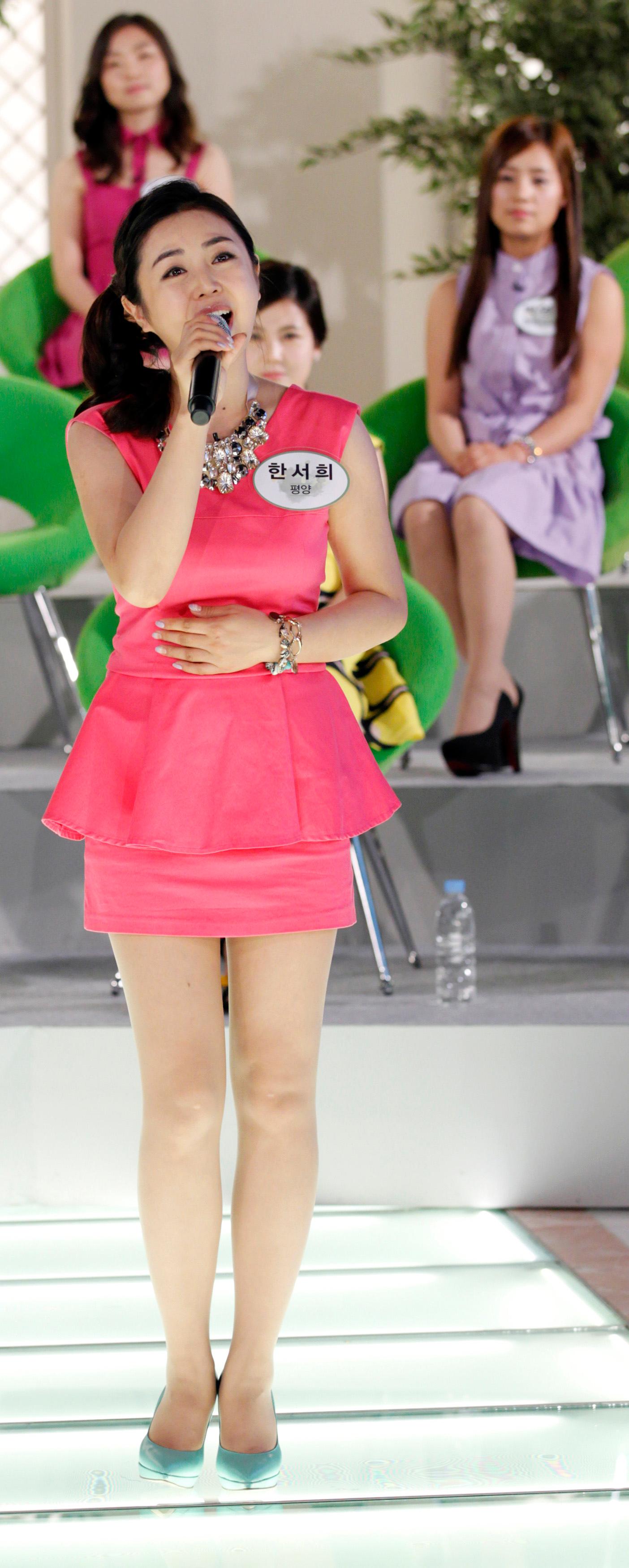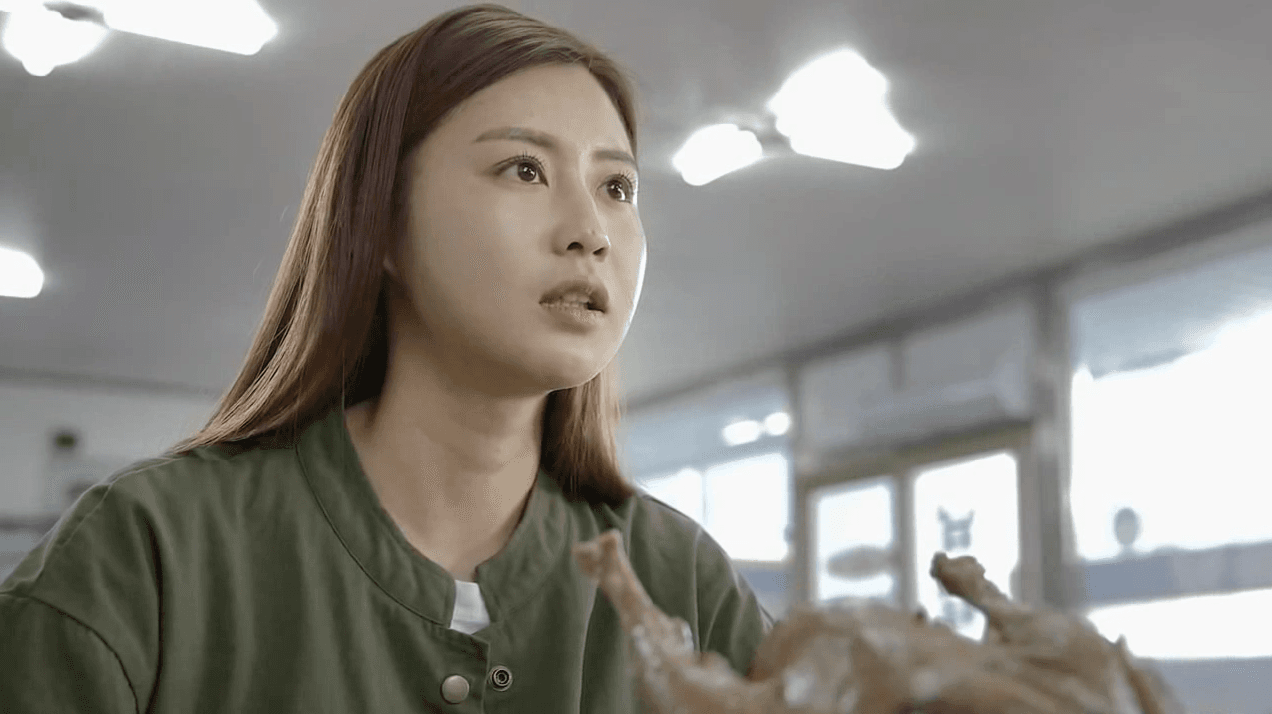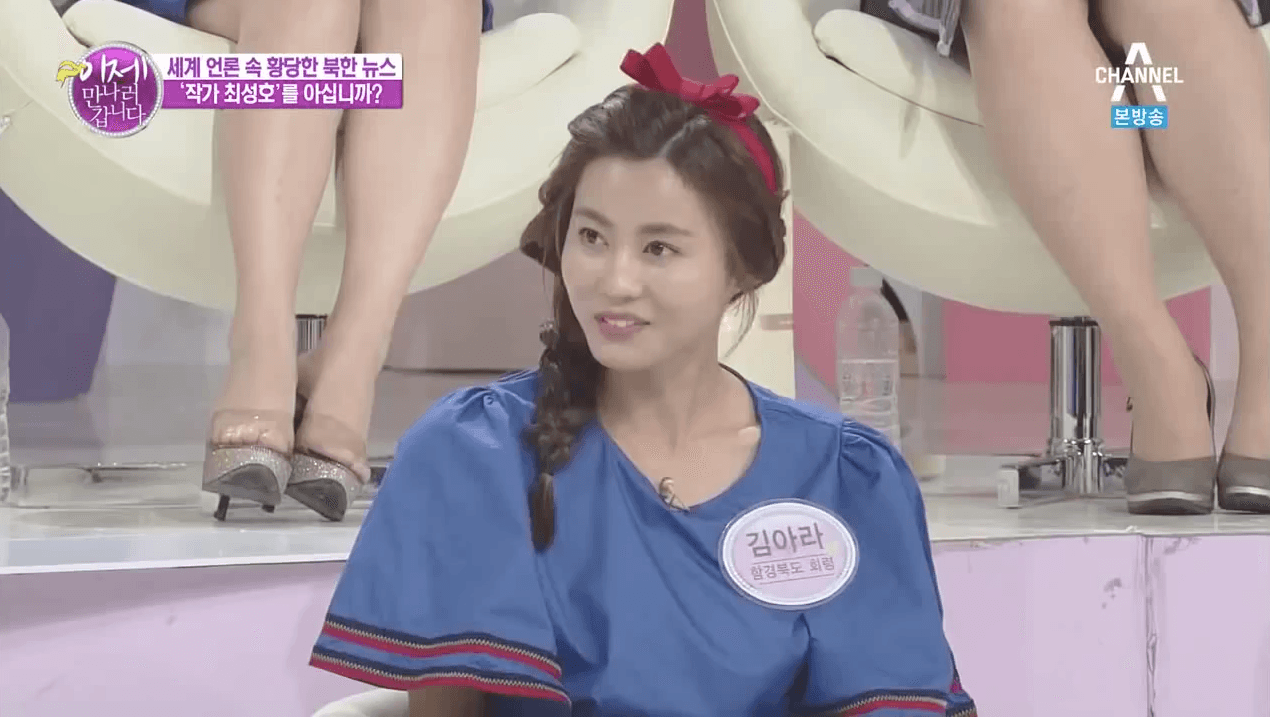Actress and North Korean defector Kim Ah-ra, 25, on a talk show showcasing “northern beauties” from North Korea.
In North Korea, entertainment is produced exclusively by the state.
It is created to stoke anti-American fervor, exalt the nation and deify the ruling Kim dynasty. Its opera singers and singing waitresses and acrobats move in exquisite socialist harmony, always projecting the power of synchronicity, never the individual performer.
You could not imagine a world more ill-suited to produce starlets for South Korea’s media industry — the flashiest, glitziest entertainment complex in all of Asia. Yet that is exactly what’s happening.
South Korean entertainment is awash in fads that come and go. Here’s one with staying power: celebrity defectors from North Korea.
In recent years, North Koreans have populated a new wave of talk shows, reality TV programs and dramas — each of them promising viewers a thrilling glimpse of life north of the Demilitarized Zone. Often enlightening, sometimes tawdry (and occasionally both), these programs have proved highly popular.
This is a media trend like none other. It wrings content from young women who’ve escaped the world’s most tyrannical regime. It sharply inverts the typical image of fly-nibbled refugees, replacing it with a new stereotype: celebrity defectors who are invariably young, female and attractive.
Among this genre’s rising stars is a 25-year-old actress named Kim Ah-ra. Her hipster leggings and elaborately painted toenails give little indication that she grew up amid famine, eating grass soup to survive.
“Before, when South Korea would talk about North Korea, it was all deadly serious,” Kim says. “Now we have shows that present us in a lighter, more human way.”
For decades, Kim says, North Korean defectors have been regarded by their southern siblings as sad, backwards and possibly still brainwashed. That is now changing.
“Now look at how big our audience is,” she says. “People love us!”
****
Kim was only 12 when she slipped away from her home province, in a mountainous corner of North Korea, to the hinterlands of China. After a long spell in the Chinese countryside, she finally defected to South Korea around 2009.
Both Kim and her mother were aided by an underground railroad run by Christians. This daring network illegally traffics North Koreans out of China and into countries that will link them up with South Korean authorities. From there, they’re given a free plane ticket to Seoul and a new life in one of the most technologically advanced societies on Earth.
Given all the lawbreaking involved, it’s best to gloss over the finer details of her defection saga. But Kim can speak more freely about her childhood in rural North Korea. Almost all of her early memories revolve around food — or rather its scarcity.
“When we had food, we ate it immediately. We’d take one or two spoons of rice, add some grass and pour in a lot of water to make a dark porridge. That had to feed four people.”
Kim was born to a father who worked in a mine and a mother who toiled on a collective farm. She didn’t go to school. She scrounged. Her job was to scour the hills for edible greenery — grass, roots, herbs, anything that could lend calories to the thin gruel they called dinner.
“We didn’t eat three fixed meals,” Kim says. “When we had food, we ate it immediately. We’d take one or two spoons of rice, add some grass and pour in a lot of water to make a dark porridge. That had to feed four people.”
From the late 1950s until the early 1990s, North Korea operated under a thoroughly Stalinist command economy. For the most part, the state was the only employer. It proclaimed itself the sole provider of food, clothing, tools and homes. North Koreans could go years without touching cash.
But when the Soviet bloc collapsed, and North Korea’s key trading partners withered away, so did the state-run distribution system. The flow of food simply shut off. Millions began to go hungry, the actress Kim’s parents included.
Teetering toward starvation, her father sold their government-issued home for 22 pounds of corn. The family then moved into a leaky shack infested with bugs. Her mother began talking openly about risking death to sneak into China and score some food.
“I remember wandering the village, looking at the ground, hoping to spot a stray noodle or chicken head,” Kim says. “My dad would cook rats and tell us it was rabbit meat.”
She recalls the day she came upon a pumpkin seed in the mud and devoured it on sight. She later realized it had passed through a dog.
Now that she’s an actress, you might wonder if Kim ever entertained the idea of performing back in North Korea.
“How can I explain this to you?” she says. “That’s like asking someone who’s never heard of pizza if they craved the taste of pizza.”
In North Korea, peasants with low-class origins have almost no shot at entering the state-run arts and performance machine.
“In a capitalist world, your individual dreams or desires are given importance,” Kim says. “In the North Korea countryside, you never think about it. Your fate is totally determined by the government.”
Yet even in North Korea, there is a path to the performing arts. But it runs through Pyongyang and other urban centers, not the bleak hinterlands.
Practically no one chooses to become a performer in North Korea. That’s the job of the state. Primary schoolchildren are hand-picked and shunted into a rigorous artistic training regimen. Government scouts comb classrooms for moon-faced girls with high-pitched voices and delicate features — all de rigueur qualities for female North Korean artists.
“I was chosen at the age of 8,” says Han Seo-hee, now 35, a vocalist and instrumentalist born in North Korea. “They were looking for girls with round heads, big eyes and clear voices. It was a huge honor.”
Han defected to South Korea in 2006. There, TV producers in Seoul noticed her fair features and immaculate poise — the same traits that caught the eyes of regime talent scouts in her homeland.

But Han was already accustomed to the spotlight. Back in North Korea, she lived a life of relative luxury. In lieu of farming or factory work, she spent her teens in rehearsal halls, learning to sing in perfect unison with other girls. Her coaches were kind but unrelenting, she says.
“They expected perfection,” Han says.
All that training paid off. While Kim was eating bugs and roots in the northern hillside, Han enjoyed the fruits of nobility in Pyongyang. She later joined the national orchestra, which provided deluxe rations including cosmetics and pineapples — prized treats that signified an elite status.
“We even got bananas!” Han says. “That’s quite rare in North Korea. My cousins were so jealous.”
Han’s career in North Korea peaked in the early 2000s when she was chosen to join a secretive supergroup performing for Kim Jong-il, the now-deceased former despot, and his inner circle.
These were particularly high-stakes sessions for Han. In addition to singing, she also played the “oungum” — a pear-shaped lute purportedly invented by the “dear leader” himself during his college days.
“Before we performed, I was extremely nervous. My friends would say, ‘Look, if you just look at our dear leader’s face, your worries will vanish,’” Han says. “But I couldn’t do it. I just stared at the wall behind him. The second time, however, I realized, ‘Oh, he’s just a human being.’”
oembed://https%3A//www.youtube.com/watch%3Fv%3DuOcFfa-25gQ%26feature%3Dyoutu.be
Han and her family had to flee North Korea in the mid-2000s. Her brother had fallen in love with a woman from a politically disreputable family. The couple escaped southward so they could live in peace — thus raising the specter of collective punishment on the family they’d left behind. Han and her parents soon followed suit by quietly escaping over the Chinese border.
These are the sorts of scandalous tales Han has been cajoled into retelling over and over on South Korean television. TV producers are also keen to showcase her sweetly operatic singing voice, honed to perfection by the totalitarian state.
But these days, Han is bit burnt out by the flood of Seoul-based shows delighting in strange tales from her homeland. “The media loves to present North Korea in the most extreme way possible,” Han says. “It’s often very silly and sensational.”
****
Kim made it to South Korea just a few years after Han. She didn’t arrive with fond recollections of pineapples and lutes. She was instead carrying a head full of grim memories.
Kim quickly learned that even the most well-meaning South Koreans were capable of remarks that could wound her soul. “Like, ‘If you were so hungry in North Korea, why didn’t you just eat some noodles?’” she recalls.
“I thought this was mean and kind of twisted. You already know we’re coming from poverty with no education. So why say these things? I already look down on myself enough.”
This private shame began to lift in 2012. That was the year a new talk show called “Now On My Way To Meet You” debuted and, ultimately, sent Kim’s life spinning in a new direction.
There is really no American analogue for this TV program. From moment to moment, it can be farcical and then chilling, often combining the two in a format that is strangely compelling.
The show is propelled by a rotating cast of North Korean defectors — almost all of them glamorously dressed young women with perfect skin. These “northern beauties,” as they’re called by the show, are quizzed by upbeat hosts about life beyond the border.
Topics can include the quirks of North Korean fashion, music and even boozing culture. (Lesson one: never recklessly slam your soju. Alcohol is hard to acquire in a broken, post-Stalinist economy.)
oembed://https%3A//www.youtube.com/watch%3Fv%3D2RNnXBjqpEs%26feature%3Dyoutu.be
Other episodes dwell on their memories of gory public executions. Despite the ghastly subject matter, producers often punch up these recollections with tacky gunfire sound effects.
When the show first aired, Kim was training in an obscure beautician school. She was instantly hooked. “I’d never seen North Korean women on TV with pedicures and dyed hair,” Kim said. “I envied them.”
Then came an invitation, sent through a former classmate and fellow defector, to join the show’s panel. She couldn’t believe her luck. “When I entered that studio, it was so bright and colorful. There were 50 cameras pointed at me,” she says. “I thought, ‘Oh, God, this is too real.’ I was so embarrassed.”
But Kim was a natural. She became a regular, joining panels on North Korean cosmetic trends and segments mocking regime propaganda.
The success of “Now On My Way to Meet You” has inspired a new spate of defector-themed shows.
There are programs that assemble faux families out of North and South Koreans and force them to complete silly tasks. More popular still is the reality show “South Korean Man, North Korean Woman” that feigns married life for the cameras. The men are often successful and older than the women who are, without exception, young and fetching.
These pseudo-couples are filmed in a variety of domestic scenarios — the “wife” cooks dinner, the “husband” treats his partner to an upcountry road trip — so that the audience can see North and South Koreans in tantalizing proximity.
Watch enough episodes and you’ll notice a theme: the female defector is meek and bumbling, soaking up life lessons about modern life from her male protector.
Kim’s manager hasn’t steered her into a televised fake marriage. Her heart is instead set on dramas, which usually pigeonhole Kim into defector roles similar to her real life.

In one of her more recent scenes, Kim is playing a North Korean on a date with a handsome South Korean guy. They lean in close over a bubbling pot of chicken. He asks gingerly if she likes eating chicken feet.
“I don’t just eat feet,” she says, her face aglow. “I eat chicken heads! And chicken waddles! Eyes too. They’re all so yummy.”
Get it?
She grew up in starvation. She’ll eat anything.
****
To watch this defector-themed programming is to enter a parallel universe — a world where, somehow, almost all of the refugees escaping North Korea have velvety locks and pearly smiles.
Park Hyun-sun, a professor at Seoul’s Ewha Womens University, plunges into this televised universe quite often. Not because she’s a fan. Park is a sociologist who focuses on North Korea. She’s paid to study the TV genre and the stereotypes it projects.
“There are rules to these shows,” Park says. “The female defectors must be pure, naturally beautiful and very servile. This isn’t the face of the average female defector. The media is using them to excite our curiosity.”
Roughly 70 percent of all North Korean defectors are female — a trend owing to various factors. Married women, responsible for securing goods for the family home, can parlay with marketplace traders — including borderland people smugglers — without attracting much attention.
Each escape attempt risks capture and years in a freezing gulag. And, when women do manage to slip into China, they face horrors that men don’t.
They’re more easily preyed upon by human traffickers or drawn toward prostitution to survive. These women cannot simply phone the cops to report abuse. Chinese authorities who discover North Korean refugees typically ship them to their homeland, back into the hands of the bleak and abusive state they fled.
Any woman who manages to navigate this maze of threats, ultimately finding refuge in South Korea, is tough by definition. “So why do they always look so weak on television?” Park says. “They’ve overcome many harsh experiences.”
The professor is particularly chafed by the faux marriage genre — namely episodes that pair older men with giggling defectors half their age.

Park has a theory about the popularity of defector-themed entertainment. In the past decade, she says, South Korean women have become more strident — openly bristling against entrenched gender roles.
“We’re becoming much more vocal,” Park says. “Yet many South Korean guys long for a traditional, pure woman to make them happy. That’s why you’re seeing so many typecast North Korean women on TV. They’re being used to satisfy a fantasy.”
But what do reality TV participants themselves think about all this? Kim describes what image she hopes to project to the world.
“I want people to see me as bright,” Kim says. “I’m a person with great curiosity. And lots of positive drive.”
But what about the professor’s theory? Does Kim view herself as brave and tough?
“Well, of course! I’m very brave. I defected as a 12-year-old,” she says. “All North Korean women are tough. We have to be.”
Kim believes she’s subtly inflecting her acting work with glimpses of North Korean female toughness. Consider the chicken feet scene, she says. That dialogue about devouring heads and eyes? “Those were my lines!” she says. “I proposed them to the director.”
That scene wasn’t a cheap joke after all, playing on her character’s desperate past. Kim was trying to depict a North Korean woman gently rebuffing some guy worried she’s too dainty to suck the cartilage off a chicken foot.
In effect, she was reclaiming her history of starvation, transforming a source of shame into a light quip — one that might normalize the background of a North Korean commoner.
“I know all the North Korean women on TV are idol types,” Kim says. “I’m embarrassed to say it but, yeah, people say I’m pretty. And that has helped me to find acceptance.”
“But I want to use that opportunity to help other defectors come out and feel less ashamed,” she says. “The media and the outside world, they’re now showing more interest in the real lives of North Koreans.”
“They’re starting to see that the story of our people is much bigger than Kim Jong-un and nuclear bombs.”
Patrick Winn reported in Seoul. Filmmaker Sona Jo contributed reporting for this story.
The World is an independent newsroom. We’re not funded by billionaires; instead, we rely on readers and listeners like you. As a listener, you’re a crucial part of our team and our global community. Your support is vital to running our nonprofit newsroom, and we can’t do this work without you. Will you support The World with a gift today? Donations made between now and Dec. 31 will be matched 1:1. Thanks for investing in our work!
